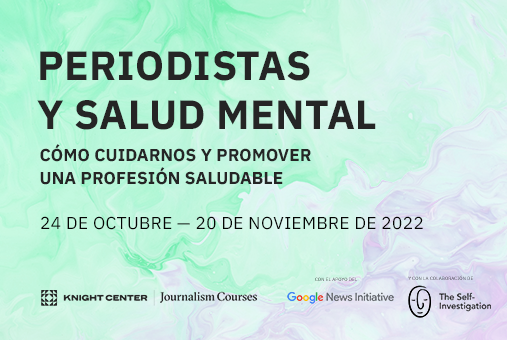Start learning today!
Get early access to learning opportunities from Journalism Courses by the Knight Center.

Prioritizing mental health isn’t easy, but it’s an important part of growing and thriving as a journalist.
For that reason, the Knight Center for Journalism in the Americas, with support from Google News Initiative and in collaboration from The Self-Investigation, is offering a free online course to teach journalists how to mind their mental health and emotional well-being, as well as how to promote healthy habits in newsrooms and the industry.
“Journalists and mental health: How to take care of ourselves and promote a healthy profession” runs from Oct. 24 to Nov. 20, 2022. Review registration instructions, a course instruction and the syllabus, then sign up today in Spanish or Portuguese!
“As a veteran journalist with more than 50 years of professional experience, I am happy to see that the new generations of media workers have opportunities like this one to learn about mental health and well-being in our profession,” said professor Rosental Alves, Knight Center founder and director. “I wish my generation had had this kind of opportunity and that there was awareness of the importance of taking care of mental health and well-being issues that are common in newsrooms.”
The course is organized into four modules that will be taught over the course of four weeks.
“For too long, the journalism industry has adopted and even glorified an ‘always on’ culture and the pandemic simply accelerated and amplified the effects of that culture on journalists’ well-being,” said Mar Cabra, a journalist, digital wellness expert and co-founder of The Self-Investigation, as well as one of the course instructors. “And we are seeing its detrimental aftermath on individual journalists and the profession more generally.”
Other instructors for the Spanish course are journalist, coach and stress reduction expert Aldara Martitegui, and journalist and compassion cultivation training instructor Natalia Martín Cantero. For the Portuguese course, Cabra and Martitegui will be joined by Guilherme Valadares, emotional balance teacher, researcher on mental health and journalism and founder of PapodeHomem and Instituto PDH.
Additionally, the main instructors will be joined by guest speakers from Latin America, Brazil and Spain, who will expand upon each week’s learning materials.
“We want this opportunity to give voice to those players who are doing amazing work on destigmatizing mental health in the media in Spanish and Portuguese and promoting a healthier and more diverse journalism culture,” Cabra said, regarding the guest speakers.
The instructors will teach the course using videos, presentations, readings, discussion forums, and quizzes.
The MOOC is designed for journalists working at media outlets, as well as freelancers. It’s also meant for managing editors, section managers and editors. It’s open to anyone who wants resources for maintaining physical and mental health in the profession, and to promote a sustainable culture of care in newsrooms and the industry.
A similar course in English was offered from June to July 2022 and attracted more than 1,200 students. Mar Cabra was also an instructor for that MOOC, which is now available as a self-directed course.
Although mental health issues “remain largely taboo or misunderstood,” as Cabra said, she also acknowledges that “things are changing.”
“There is increasing interest in exploring how we can create healthy work environments in journalism that promote good mental health practices,” she said, pointing to the English course as proof.
This MOOC is asynchronous, meaning students can complete activities on the days and at the times that best suit their schedules. There are recommended weekly deadlines so students don’t fall behind.
Those who successfully complete course requirements and pay US $30 are eligible for a certificate of completion. No formal academic credit is associated with the certificate.
Don’t put off prioritizing your mental health and well-being and that of your colleagues. Register for this excellent (and free) online course today in Spanish or Portuguese!
Get early access to learning opportunities from Journalism Courses by the Knight Center.